Yes, all species of penguins lay eggs. The majority of penguins typically lay two eggs per breeding cycle. Some species lay one egg. Emperor penguins and King penguins are known for laying one egg every year.
Penguins exhibit oviparity, a type of reproduction in which there is no embryonic development inside the mother. When a female penguin conceives after copulation, she lays eggs instead of giving birth. Penguins take great care of their laid eggs and hatched chicks, under the influence of their special nurturing instincts.
Together, the monogamous penguin couple constructs their nest, delivers their egg and then raises the chick after it hatches. Parent penguins have a unique division of labor to ensure the successful nurturing of their chick. In this article, we will explore penguins’ fascinating breeding and parenting behaviors.
Are Penguins Mammal?
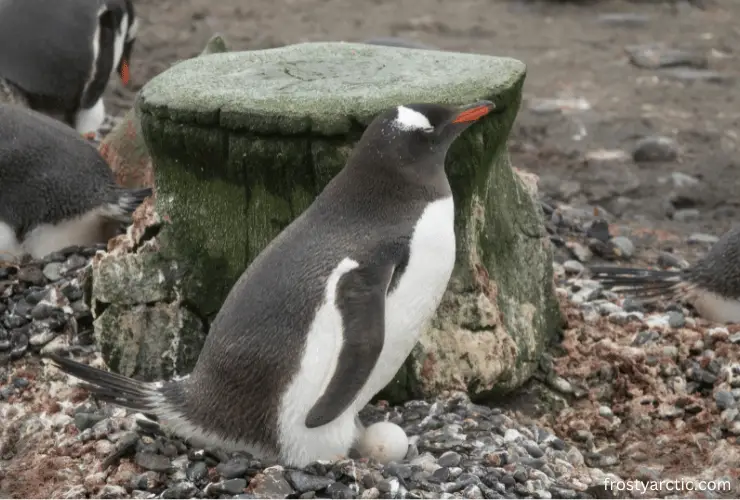
No, penguins are flightless aquatic birds belonging to the class of “Aves” (birds). Penguins are largely mistaken for mammals because they cannot fly. Even though penguins are vertebrates just like mammals, they have a variety of bird-like features that set them apart from mammals.
Penguins are classified in the order Sphenisciformes, including those birds that have lost their ability to fly over evolution.
Penguins possess a condensed layer of feathers on their bodies. This insulating plumage layer appears as fur, contributing to the misbelief in their classification as mammals.
Penguins are egg-laying organisms, while mammals reproduce by giving birth to live young. Penguins also possess wings, which is another defining avian trait. These wings have evolved to serve as flippers.
Another primary trait that differentiates penguins from mammals is that female penguins do not nurse their chicks with milk.
Mammals are known for possessing mammary glands, which enable them to provide mother’s milk for their offspring. Penguins also have a skeleton structure similar to that of birds. Penguins have short, hollow bones, like birds.
The following is a table that shows the traits of penguins that resemble birds and those that resemble mammals.
| Avian-Like Traits of Penguins | Mammalian-Like Traits of Penguins |
| Possess feathers | Common ancestor of evolution |
| Reproduce through laying eggs | Vertebrates |
| Have wings and Feet (not arms and legs) | Warm-Blooded |
| Do not produce milk | Walk on land |
| Hollow bones & fused backbone | Monogamous mating |
| Toothless bills | Affection for the off-springs |
Do Penguins Lay Eggs or Give Birth?
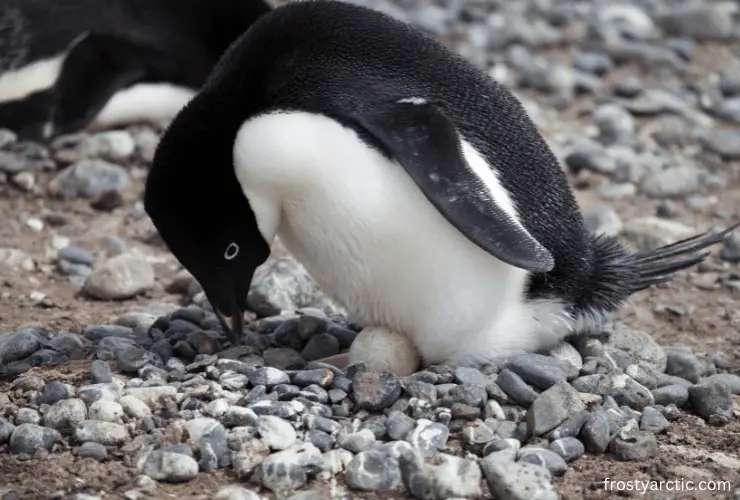
Penguins are aquatic birds that lay eggs. Birds are known for their ability to reproduce by laying eggs with a hard shell that contains an embryo in development. Just like other birds, penguins also experience internal fertilization. In the internal fertilization of penguins, the egg cell fertilizes inside the female penguin after copulation.
After fertilization, the female penguin lays the eggs in the nest. The egg has to be incubated by the parents for the development of the embryo inside it. The incubation period for the eggs of every penguin species is variable.
During incubation, each parent takes turns keeping the egg underneath their brood patch. The incubation period concludes when the embryo inside the egg develops into a chick. Now is the time for the chick to break free from its shell.
The chick starts chipping and cracking the eggshell by poking holes in it with its beak. It takes about 2 to 3 days for the chick to emerge completely from the shell. The chick starts making peeping sounds to make its parents familiar with its signals.
| Penguin Species | Scientific Name | Time Period Before Hatching |
| African Penguins | Spheniscus demersus | 38-41 Days |
| King Penguins | Aptenodytes patagonicus | 54 Days |
| Emperor Penguins | Aptenodytes forsteri | 64 Days |
| Gentoo Penguins | Pygoscelis papua | 34-31 Days |
| Erect Crested Penguins | Eudyptes sclateri | 1 Month |
| Little Penguins | Eudyptula minor | 35 Days |
| Adelie Penguins | Pygoscelis adeliae | 32-34 Days |
| Galapagos Penguins | Spheniscus mendiculus | 38-42 Days |
How Many Eggs Do Penguins Lay Each Year?
The number of eggs penguins lay each year depends on the species and reproductive rhythm of the respective species. The number of eggs laid by a penguin in every breeding cycle varies from species to species.
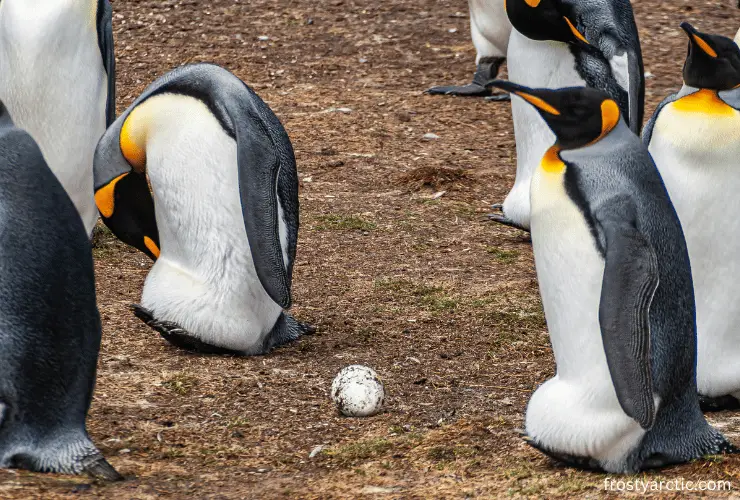
The majority of penguins typically lay two eggs per breeding cycle. The only exceptions to this pattern are the Emperor and King penguins.
Emperor penguins and King penguins are known for laying one egg every year. King penguins breed every 14 to 18 months, whereas Emperor penguins breed only once a year, from spring to summer.
Erect-crested penguins exhibit unique reproductive behavior. These penguins lay two eggs but reject the first one. They only incubate and nurture the second egg. This ensures the proper development and survival of at least one chick.
| Penguin Species | No of Eggs/Cycle |
| African Penguins | 2 |
| King Penguins | 1 |
| Emperor Penguins | 1 |
| Gentoo Penguins | 2 |
| Erect Crested Penguins | 2 |
| Little Penguins | 1-2 |
| Adelie Penguins | 2 |
| Galapagos Penguins | 2 |
Why Do Penguins Only Lay One Egg?
The size of the clutch of any penguin species depends on the breeding season and geographical specifications of their habitat. Only two penguin species are acknowledged for laying only one egg.
Emperor penguins and King penguins lay only one egg over the course of one breeding cycle. The precise reason behind this natural pattern is unknown.
However, it is assumed that the reason behind laying one egg lies in the incubation method of Emperor and King penguins.
Emperor and King penguins incubate their eggs by balancing them on their feet. Due to this delicate balance, they can only care for one egg. Another reason could be the climate of their habitat. Chicks of Emperor and King penguins hatch during the chilly season in Antarctica. Penguins can guard, feed, and care for a single chick more effectively.
Another interesting parenting behavior found in Erect-crested penguins is that they lay two eggs but reject their first egg. The first egg is smaller in size as compared to the second egg.
The chances of survival for the first egg are always lower. The second egg, which has a better chance of survival, is therefore incubated by Erect-crested penguins.
Why Do Male Penguins Look After the Egg and Not the Female?
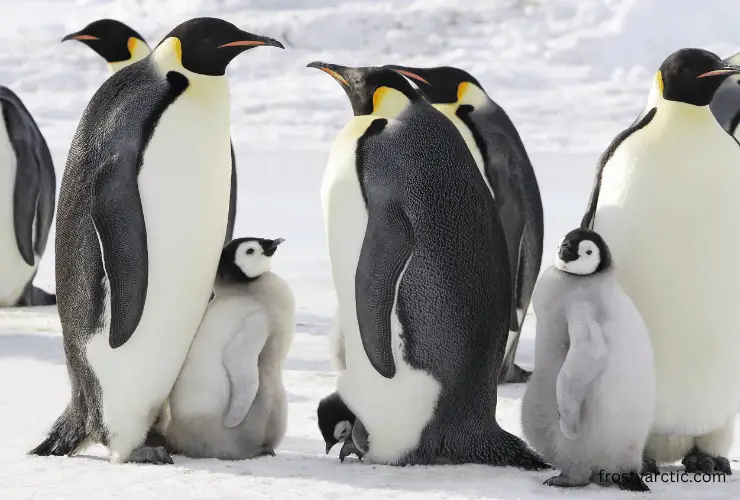
Penguins have remarkable parenting instincts and behaviors. They have an unwavering devotion to their eggs and chicks. In the species of Emperor penguins, male penguins embrace the role of incubating and looking after the eggs.
It is because male Emperor penguins gain a lot of fat in the summer. This fat helps the male survive without food when he is incubating the eggs.
Emperor penguins’ eggs must be constantly incubated to protect them from freezing in the bone-chilling temperatures of Antarctica. The female penguin immediately hands the egg to the male penguin after she lays it and begins looking for food.
The male penguin carefully balances the egg on his feet and covers it with his brood patch. During the incubation period, male Emperor penguins fast and only survive on the energy provided by the breakdown of body fat.
Except for Emperor penguins, all of the other penguin species equally contribute to the role of parenting. Male and female penguins take turns incubating the eggs.
At the moment, when one parent is incubating the egg, the other embarks on a quest for food and sustenance. When the chick hatches from the egg, both parents take on the responsibility of feeding and nourishing it.
FAQs
Q: Are Penguins Mating For Life?
A: Yes, penguins mate for life because they are mostly monogamous. Most of the penguin species stay loyal to one partner throughout their lives. However, some penguins mate with 2-3 partners every breeding season.
Q: Do Penguins Physically Mate?
A: Yes, penguins mate physically, similar to other bird species. Penguins have internal testes. When two penguins pair up, the male penguin aligns its cloaca (joint cavity for excretion and reproduction) with the cloaca of the female. Once the cloaca aligns, sperm are deposited into the female reproductive system.
Q: Do Penguin Males Have Babies?
A: No, male penguins cannot have babies. By nature, only females have the ability to bear babies. However, male penguins can take over eggs laid by female penguins for the purpose of incubation.
Q: Can Male Penguins Mate?
A: Yes, male penguins can mate. Penguins frequently form monogamous pairs in which they grow close to one another over the course of the breeding season. Male penguins set up their territory and attract females for mating.
Q: Do Male Penguins Give Milk?
A: No, male penguins do not give milk. However, male penguins have the ability to produce a specialized secretion called “crop milk”. It is a curd-like protein-rich substance produced by a gland present in the esophagus of male penguins.
Conclusion
Penguins are fascinating, flightless birds. These have changed over time to fit in with aquatic environments and aquatic life. Penguins are monogamous and oviparous. They lay eggs in the special nests built during the breeding season. Penguins are devoted parents and exhibit captivating parenting behaviors. When it comes to raising their young, male and female penguins contribute equally.
Despite having mammal-like characteristics, penguins are fundamentally birds and are often misidentified as mammals. Penguins are facing serious extinction threats due to lethal climate change and global warming.
Several penguin species are in danger of going extinct and are endangered. Therefore, it is imperative that we act decisively to save penguins from extinction.

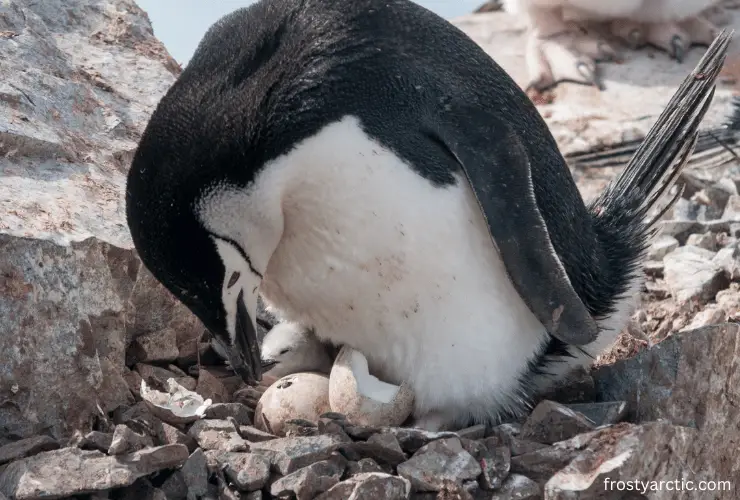

4 thoughts on “Do Penguins Lay Eggs? [Explained]”